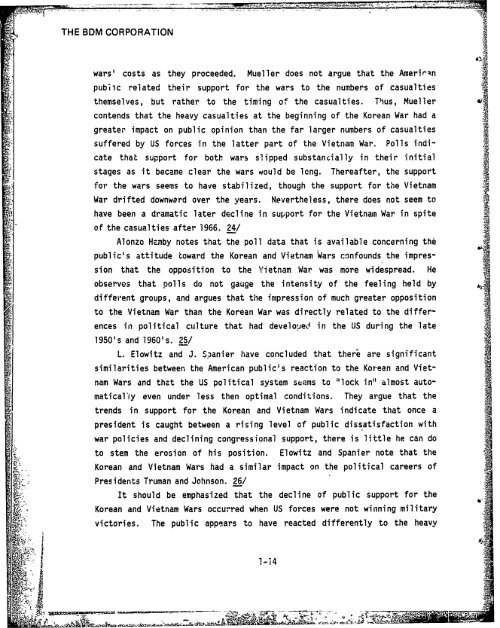policy - The Black Vault
policy - The Black Vault
policy - The Black Vault
Create successful ePaper yourself
Turn your PDF publications into a flip-book with our unique Google optimized e-Paper software.
THE BDM CORPORATION<br />
I el<br />
wars' costs as they proceeded. Mueller does not argue that the AmerirAn<br />
pubjic related their support for the wars to the numbers of casualties<br />
themselves, but rather to the timing of the casualties. Thus, Mueller<br />
contends that the heavy casualties at the beginning of the Korean War had a<br />
greater impact on public opinion than the far larger numbers of casualties<br />
suffered by US forces in the latter part of the Vietnam War. Polls indicate<br />
that support for both wars slipped substancially in their initial<br />
stages as it became clear the wars would be long.<br />
<strong>The</strong>reafter, the support<br />
for the wars seems to have stabilized, though the support for the Vietnam<br />
War drifted downward over the years. Nevertheless, there does not seem to<br />
have been a dramatic later decline in support for the Vietnam War in spite<br />
of the casualties after 1966. 24/<br />
Alonzo Hemby notes that the poll data that is available concerning the<br />
public's attitude toward the Korean and Vietnam Wars confounds the impression<br />
that the opposition to the Vietnam War was more widespread. He<br />
observes that polls do<br />
not gauge the intensity of the feeling held by<br />
different groups, and argues that the impression of much greater opposition<br />
to the Vietnam War than the Korean War was directly related to the differences<br />
in political culture that had developed in the US<br />
1950's and 1960's. 25/<br />
during the late<br />
L. Elowitz and J. Sanier have concluded that there are significant<br />
similarities between the American public's reaction to the Korean and Vietnam<br />
Wars and that the US political system seems to "lock in" almost automatically<br />
even under less then optimal conditions.<br />
trends in support for the Korean and Vietnam Wars<br />
<strong>The</strong>y argue that the<br />
indicate that once a<br />
president is caught between a rising level of public dissatisfaction with<br />
war policies and declining congressional support, there is little he can do<br />
to stem the erosion of his position. Elowitz and Spanier note that the<br />
Korean and Vietnam Wars had a similar impact on the political careers of<br />
Presidents Truman and Johnson. 26/<br />
It should be emphasized that the decline of public support for the<br />
Korean and Vietnam Wars occurred when US<br />
forces were not winning military<br />
N. victories. <strong>The</strong> public appears to have reacted differently to the heavy<br />
1-14<br />
IS -~--.----
















